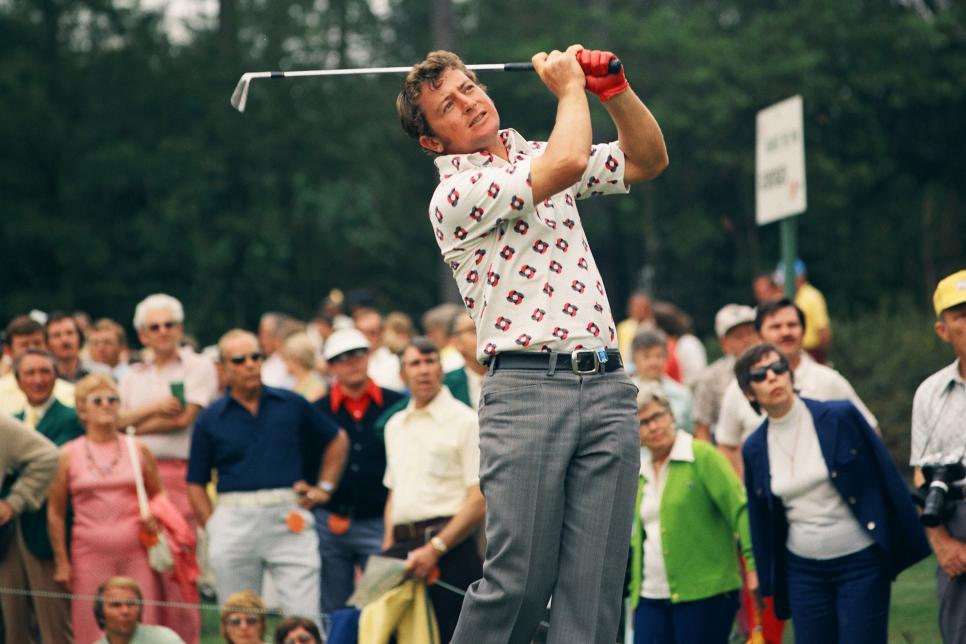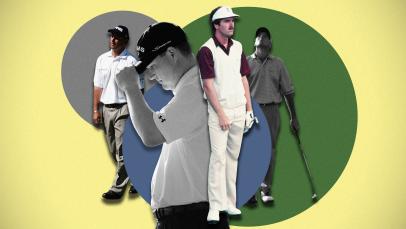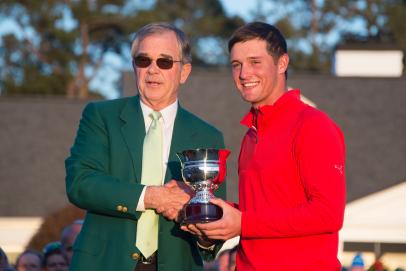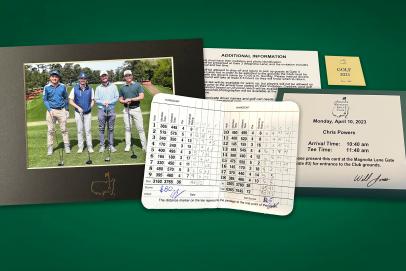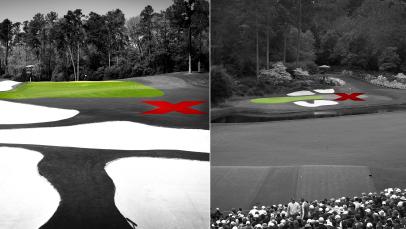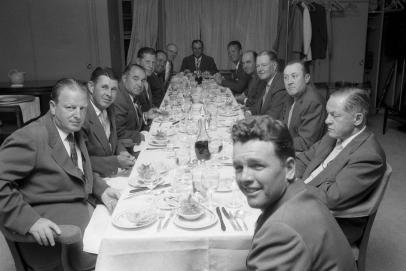Backed by a sizeable pile of anecdotal evidence—and with all due respect to Scottie Scheffler, the man who currently holds the title—a strong theory exists that the claim “I’m the best golfer on the planet” tends to be a relatively short-lived boast. Other than Jack Nicklaus and Tiger Woods—the eternal exceptions to almost every golf rule—even those consistently pre-eminent invariably find “World No. 1” a transient title. Tom Lehman is the most extreme example; the 1996 Open champion’s predominance lasted just seven days. And he is not alone. Often enough earned by hardly prolonged moments of inspiration, global supremacy has been assumed by a lengthy list of players since 1986, when the rankings first came into existence.
Not that such a state of affairs is actually surprising. Especially in these modern days of an often competitive stalemate at the game’s sharpest end, many are capable of making a sudden stream of birdies. At its best, golf remains a capricious business.
Welcome then, to April 14, 1974, the final round of the 38th Masters at Augusta National and the unlikely sight of a diminutive (5-feet-7), short-hitting, pipe-smoking, avid ornithologist playing one of golf’s most iconic venues as well as anyone ever had to that point.
Maurice Bembridge, who passed away in March at age 79, was a four-time Ryder Cup player when Great Britain & Ireland rather than Europe took on the United States in the trans-Atlantic contest. The Englishman won six tournaments on the European Tour between 1973 and 1979, his most productive year coming in 1974, with three victories that included the PGA Championship at Wentworth (where he fittingly closed with an eight-under par 64).
For much of his career, the Worksop-native (a middle-England hometown he shares with former World No. 1 Lee Westwood) was one of the better players on the Old World circuit. In a reflection of the times he lived in, however, Bembridge made only 13 starts on the PGA Tour.
Never mind. For one 18-hole stretch—OK, maybe only nine—Bembridge was clearly the best player on the planet, even if he ultimately finished T-9, five shots back of winner Gary Player. For Bembridge, who would go on to set the record for lowest score in the final round at Augusta National with his closing 64, the old saying that the Masters doesn’t truly begin until the back nine on Sunday came true in an unforgettable way.
• • •
No one saw it coming, certainly not the man himself. One of only four Europeans in the field (Tony Jacklin, Peter Oosterhuis and amateur Trevor Homer the others), Bembridge arrived in Augusta for his second Masters start (the other coming in 1970) at the conclusion of a four-tournament run in Thailand, Malaysia, the Philippines and India. His best finish during that no-doubt humid month was a T-7 in the Malaysian Open. “Steady rather than spectacular” was how he described his form.
“I always used to leave England in early October,” Bembridge told Golf Digest in an interview last December. “And I didn’t go back until April. Typically, I was in Australia, New Zealand and the Far East.”
This time, that long absence from his homeland almost immediately followed Bembridge’s third Ryder Cup appearance. In a losing cause at Muirfield, he notably combined with Welshman Brian Huggett to defeat Nicklaus and Arnold Palmer in a first-day four-ball en route to accumulating a creditable three points from six matches. Perhaps most significantly, however, the then 28-year-old took on Nicklaus twice in the final day singles. In both, the Golden Bear was hunted to the final green. The first game was halved before Nicklaus edged Bembridge in the second, 2-up.
“I think that performance may have contributed to my invitation to the ’74 Masters,” Bembridge said. “Maybe Jack put in a word.”
After 54 holes Bembridge was a so-so three-over par (73-74-72) and 12 shots off the lead held by two-time PGA champion Dave Stockton. Before teeing-off Sunday alongside 1971 Masters champion Charles Coody, Bembridge’s pre-round aim was one far removed from ultimate victory. More prosaically, finishing inside the leading 24 players would guarantee an invitation to the 1975 Masters.
That target was looking more attainable by the time Bembridge stood on the 10th tee. Two under par for the day and bogey-free, he had played the first half of the course beautifully without holing any putts of significance.
“I remember hitting almost every shot on the front-nine almost perfectly,” he said. “I was disappointed only to make two birdies—at the second and the seventh, although I must admit we were playing from what today would be forward tees [Augusta National measured 7,020 yards in ’74; this year it’s officially 7,555]. Anyway, I had birdie chances at every hole and missed seven of them.”
Things, however, soon took a turn for the better. By the time Bembridge arrived on the 14th tee, he was six under par for the round. Impressively, he had birdied all four holes since the turn.
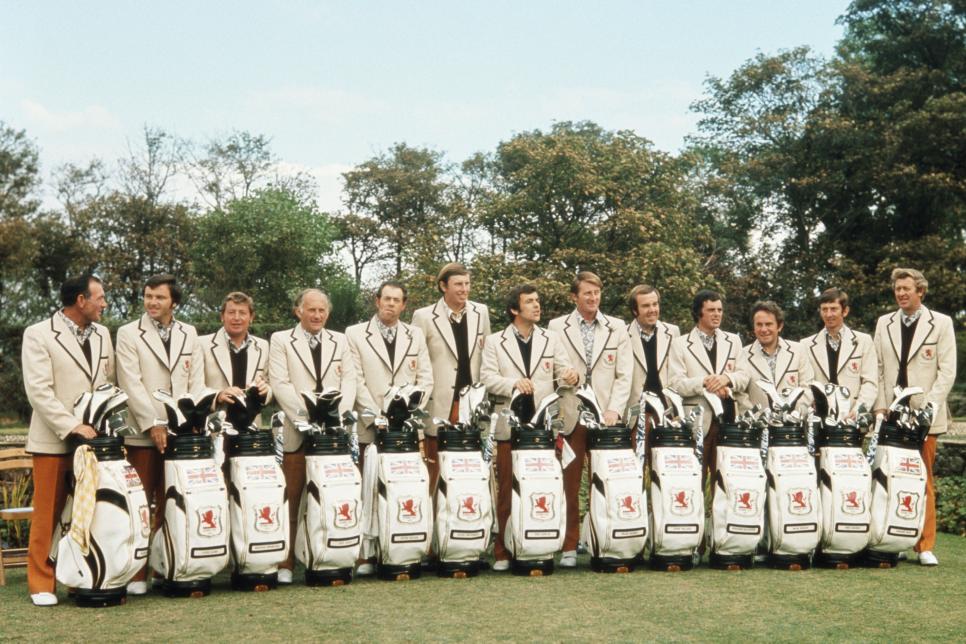
Bembridge (third from the left) belives that solid play for the 1973 Great Britain & Ireland Ryder Cup team in two singles matches against Jack Nicklaus helped secure his 1974 invitation to Augusta.
Getty Images
• • •
“The hole kept getting in the way,” said Bembridge, who used his putter only 11 times and estimates he made about 110 feet of putts in a back-nine 30. “My game just turned on even though I hated the tee shot at 10. I never liked to hit driver as I found it hard to turn the shot over. So I went with my 3-wood and was able to hit my 3-iron approach from the level ground. It finished 10 feet away and I holed the putt. I enjoyed playing that hole so well. Then I birdied the next three, too.
“On 11 you used to be able to bring the ball in from the right and not mess with the water,” he continued. “I did that and was about 25 feet away when I holed a ‘no-brainer.’ The ball was going like an express train when it went in. I’d have been on the next green if it had missed. But it hit the back of the cup, hopped in the air and went in. On 12, the pin was back right and I got it in there to about 12 feet. And I holed that to get into red figures overall.”
Another birdie followed on the par-5 13th, one marked by danger other than the challenge offered by the meandering of Rae’s Creek. At least in the eyes of his local caddie, “Pappy,” Bembridge faced a life-threatening situation.
“I was in the middle of the fairway off my drive,” he recalls. “But Pappy was 50 yards away in the trees at the top of the hill. I had to shout him over. He shouted back, ‘I can’t carry there, man. He’s going to get you, he’s going to kill you!’ I had no idea what he was talking about until he pointed to a little black thing sitting behind the ball.”
Turns out a water moccasin appeared from nowhere. “I’m told can be dangerous. I didn’t know that though,” Bembridge said. “I pulled my 2-iron from the bag, walked over and gave him a pop on the head. Then I picked him up with the club, carried him down to the stream and dropped him in. Back at the ball, I actually had the right club. So I hit the 2-iron off a bit of a hanging lie. It got over the water and finished on the front edge of the green. I lagged to maybe four feet and holed for 4. Routine stuff really [laughs].”
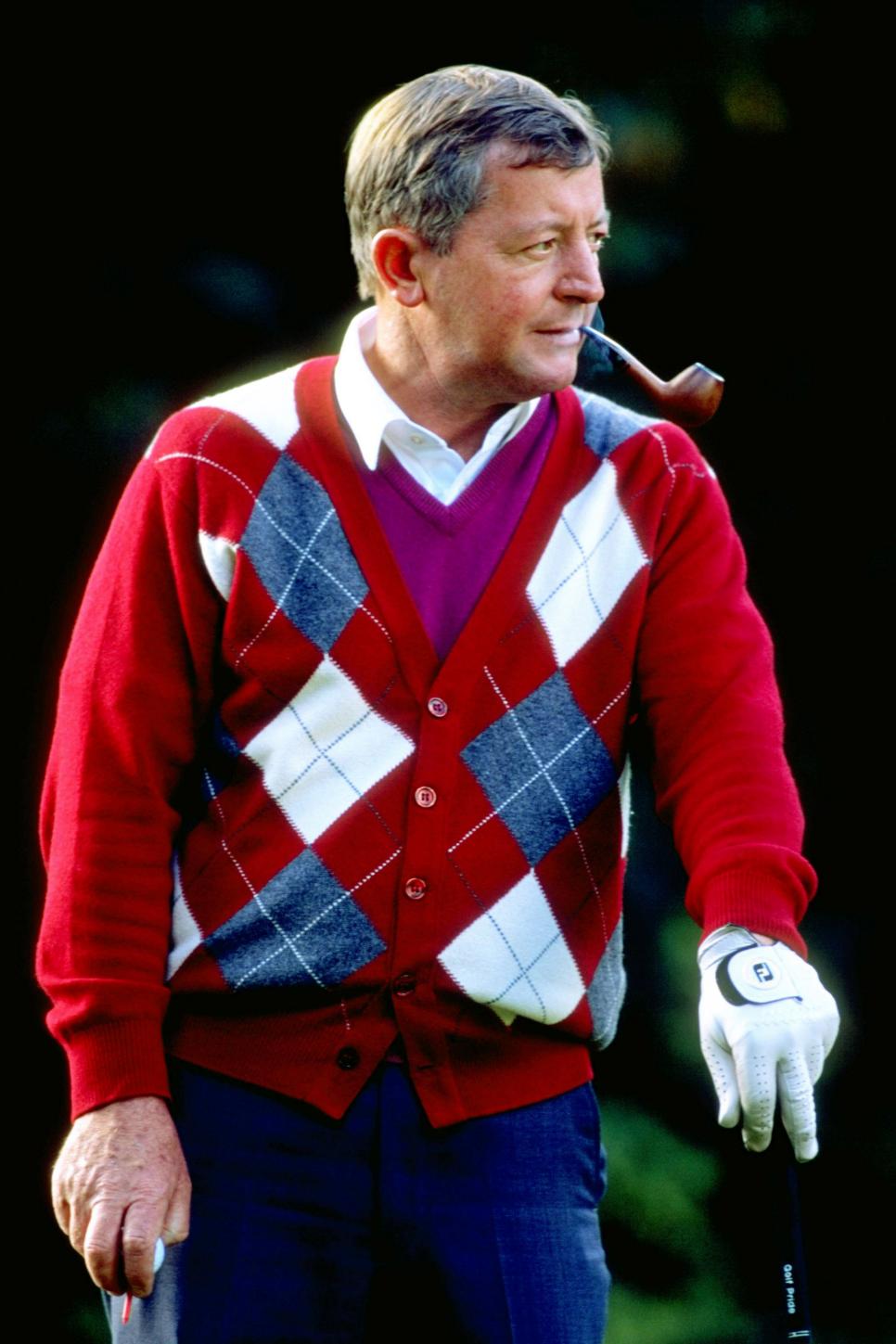
It was common to see Bembridge smoking his pipe while on the course.
Graham Chadwick
Yet another birdie chance came along at the 14th, but from six feet above the hole, Bembridge missed. Still, what had suddenly become normal service resumed with a pitch-and-putt birdie from two-feet at the par-5 15th.
“That birdie on 15 was straightforward,” Bembridge recalled. “But then the real drama started. On 16, I was in the bunker right of the green, which was not good. I was never an expert bunker player. So I played right of the flag to keep the ball on the green. All I could see beyond was the pond. It finished maybe ten feet away and I holed that for a par, which was a great relief.
At that point, the adrenaline was flowing strongly as Bembridge found the fairway at 17. “I hit a 7-iron, pulled it and it went long, pitching over the green. I finished down on the 18th tee. It was a difficult shot from there. I hit a little 7-iron punch into the bank. It hopped up there to the edge of the green about 15 feet from the flag. Then I holed that, too.”
• • •
Another superior drive followed off the 18th tee, before Bembridge’s 6-iron approach shot off the downslope on the back of the front bunker and ran all the way to the green’s top-tier. With the pin front-left, he was faced with a delicate 25-foot putt down the slope.
Due to his early tee time, none of Bembridge’s 64 shots would be shown live to the worldwide TV audience. But they did see his final putt on tape.
“We have called attention so far to the players down to the point of being seven under par,” said CBS host, Ray Scott. “Take a look at that name ‘Bembridge.’ First name ‘Maurice.’ You see that figure? … 18 holes complete, five under par. He started out today three over par. And here he is on the 18th as we recorded earlier today. This is for his eighth birdie of the day. That tied the Masters Tournament record of 64 first set by Lloyd Mangrum in 1940, equaled by Jack Nicklaus in 1965. It’s the best fourth round ever turned in by any player here at the Masters. It’s the finest.”
Indeed, Bembridge’s round wouldn’t be surpassed 12 years later when Nick Price became the first player to shoot a 63 at Augusta. And while seven other 64s in final rounds, most recently by Rory McIlroy in 2022, no one has gone lower on Sunday.
“I remember thinking if I breathed on it, the ball was away,” says Bembridge of the climax to his round. “I brushed it down there and it went in. I had the perfect pace. It went left, then right and went in nicely. It was an amazing run really. All I did was follow the old lesson about playing for pars and let the birdies come where they may. And I had no idea I had shot only the third 64 in the Masters and the first ever in a final round. I was just glad it was over. I had a plane to catch, the 4:30 out of Augusta to New York. Then I was on a 10 p.m. flight from there to Madrid. I was playing in the Spanish Open the following week.”
Packing his bags in the locker room, Bembridge was approached by an official who requested he make himself available for the traditional post-tournament interview in the Butler Cabin. That clearly wasn’t going to be possible, given the Englishman’s itinerary. A few minutes later though, the official returned accompanied by British journalist Peter Dobereiner. An alternative schedule had been arranged, one that would get Bembridge to New York in time to make his Spanish connection.
“Peter told me I couldn’t say no, being invited to the Butler Cabin was like meeting the Queen,” says Bembridge with a smile. “He told me not to worry about my flight; they would take care of it. And they did.”
'The hole kept getting in the way. My game just turned on.'—Maurice Bembridge explaining his record-round of 64
In the iconic cabin located left of Augusta National’s 10th tee, Bembridge, who earned $3,900 for his T-9 finish, joined Player (then the only non-American to win a green jacket) and the two runners-up, Tom Weiskopf and Stockton. All were interviewed by Augusta member and famed Arkansas football coach Frank Broyles.
“We want to tell you again of the great round turned in by England’s Maurice Bembridge, Broyles told the watching tv audience. “He began the day on three over par. Recorded eight birdies. No bogeys. And shot a record-equaling 64. The best round ever turned in by a foreign player here at the Masters. Maurice, congratulations on tying the course record. Tell us a little about the round.”
So Bembridge did, detailing a score that was three-shots superior to anyone else in the 44-man field that day (which earned him the customary crystal vase from Augusta National for the day’s low score). Coody and Nicklaus both shot 67 and only seven men broke 70.
Still, what came later was, for the man himself, almost as much fun.
“I had no idea when I got on the plane, but my ride was with the boss of CBS in his company jet,” says Bembridge, whose Masters career came to a much less distinguished end in 1976, with a second-round 86 and a missed cut. “All of their big wigs were there. I didn’t know who any of them were or anything about them other than they enjoyed gin and tonics and liked to play rummy. I also had a gin & tonic on the way, maybe two. At Newark, there was a limo waiting at the bottom of the steps and I was driven to JFK. And I made my flight to Madrid. Later on, I discovered that [CBS commentator] Ben Wright had been kicked off the plane from Augusta. I got his seat. He didn’t speak to me for ages after that (laughs).”
Backing up the “No. 1 in world changes every day” theory, Bembridge’s moment in the Georgia sunshine was predictably brief. In the subsequent Spanish Open at La Manga he shot 73-70-79-73, finished T-15 and ended up a distant 16 shots behind the winner, American Jerry Heard. For that seven-over par effort, Bembridge was paid a measly £385.33. But no matter. For one round six days earlier, he was clearly the best player anywhere.


